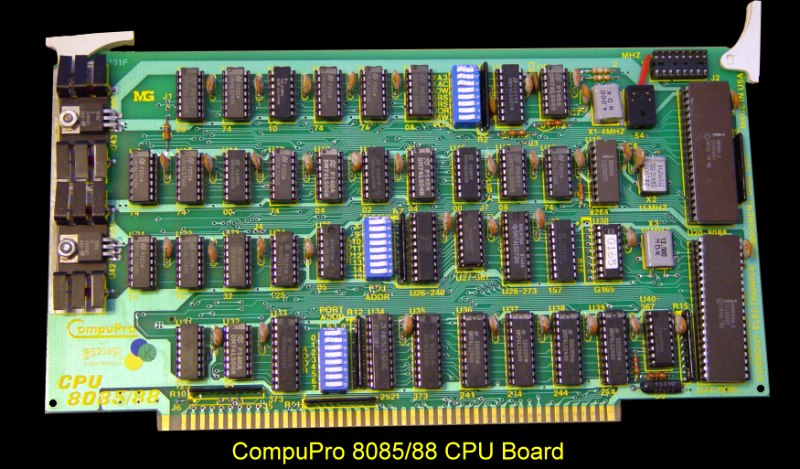
CompuPro - CPU 8085/80
This was CompuPro's first 16 bit CPU
board. By combining the 8085 with an 8088 on the one board it provided a
convenient way for users to migrate from 8 bit/CP/M software to 16 bit systems
even though the absence of a Z80 with its efficient special op-codes was a
frustration.

The 8085 provided both hardware and
software compatibility with the current crop of S-100 peripherals. The 8088
provided for greatly enhanced software capability while maintaining an 8 bit
external bus for hardware compatibility. The user could switch back and forth
between the two processors with a simple software command. For example, this
allowed the user to let the 8085 run his currently available (and familiar) disk
operating system while letting the 8088 run the more advanced applications
software. One processor would then "call" the other to handle the task
most suited to it. This environment is also extremely effective when trying
to develop new software for the 8088. One could use tools available that run
under the 8085 (such as CP/M and Sorcim's 8086/88 Macro Cross-Assembler that
ran under CP/M) to write the new code and then simply switch over to the 8088 to
try it out. PROM's did not need to be burned and erased and systems pulled apart
to transfer the code to the 8088 system. The 8088 ran at 8 MHz and the 8085 at 6
MHz to maximize throughput. A switch was provided to slow the 8085 down to 2
MHz for software dependent timing loops that want to run at that speed and
are not easily changed. The 8085 could of course directly address 64K bytes of
memory, but the board had a built-in Memory Manager scheme that
allowed access to the full 16 megabytes available per the IEEE 5-100 standard.
The 8088 could directly address 1 megabyte, but their Memory Manager hardware
was smart enough to know which processor is in control. Thus the 8088 used only
the upper four bits of the Memory Manager so it too can access the 16 megabyte
address space. The CPU 8085/88 rigidly adhered to the IEEE S-100 standard, but
seemed to work quite well with most well designed pre-IEEE hardware. For
example, provision is made to use the IMSAI front panel even though it
doesn't exactly fit into the new standard.
The manual for this board can be obtained
here.
Other CompuPro S-100 Boards
CPU8085-88
CPU86-87
CPU-Z
Disk1 Disk1A
Disk1B
Disk2
Disk3
EconoROM2708
Interfacer 1
RAM Boards
Interfacer 3 Interfacer 4 Interfacer II
M-Drive
MPX-Board
PC-Video
System-Support1
System-Support2
SPIO
Spectrum SP186
CPU-286
68000
32016 SPUZ
This page was last modified
on
10/25/2013


